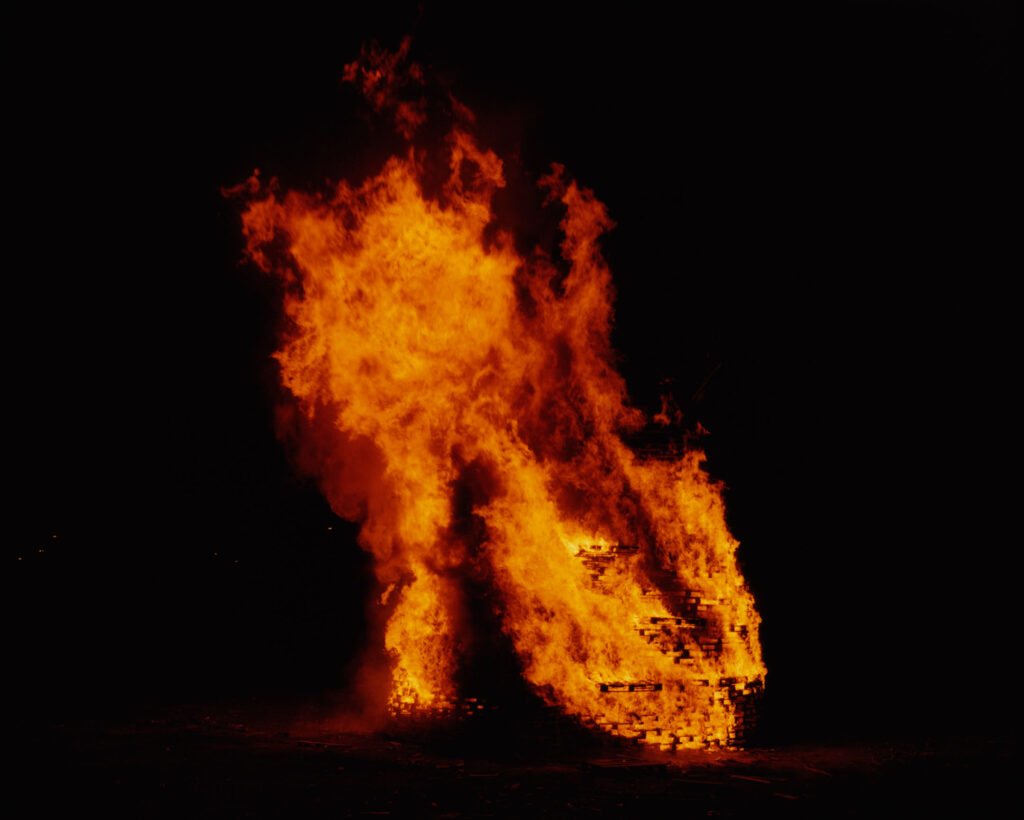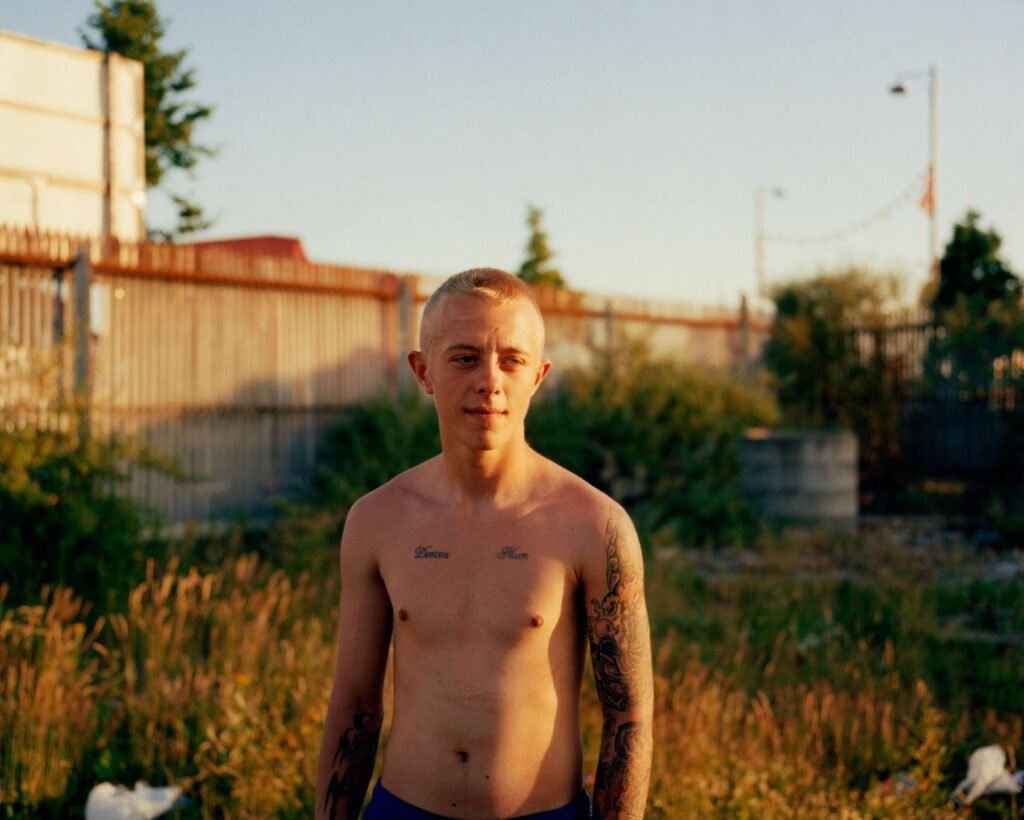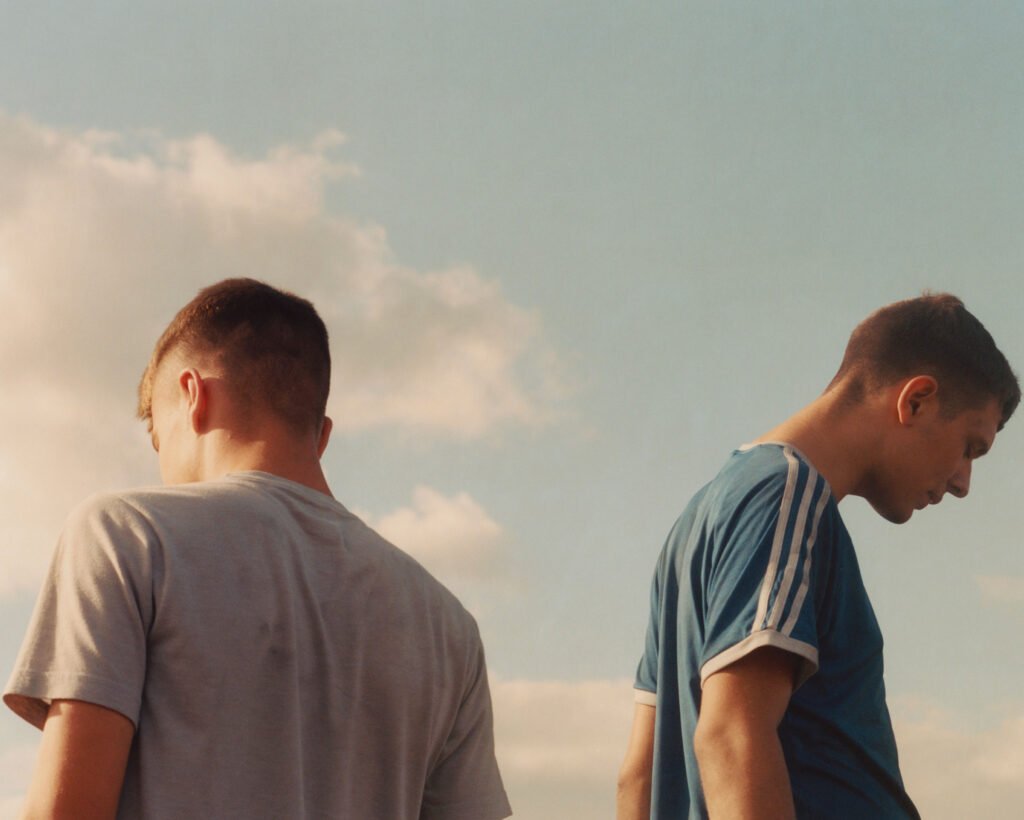Belfast is a divided city. I remember being there a couple of years ago in the daylight and feeling tense energies around the ‘peace lines’, walls meant to separate republicans and nationalist Catholics areas from loyalist and unionist Protestant areas. Even now, twenty-three years after Northern Ireland peace process and the Good Friday Agreement, these walls show no weaknesses and still impede cross-community trust at a local level.
Irish photographer Enda Bowe’s series Love’s Fire Song depicts youth life on either side of the ‘peace lines’, taking as his starting point the symbolic bonfires of the 12th and 8th August, which mark the recurrence of King William of Orange’s victory in the 1690 Battle of the Boyne and the 1971 imprisonment of 342 nationalists. Yet, the bonfires’ warm light expands in the whole series, elevating Bowe’s documentary to a poetic and subtly symbolic level. Indeed, instead of merely picturing the tension and brutality of such places, Bowe’s images focus on the ordinary suspension lingering in the moments of intimacy and are capable of raising a quiet protest because of this destabilising intimacy, which is not represented but intrinsic to the images (Nancy 2005). Could this intimacy be seen as a key to an effective and ethical documentary practice? While violent and loud images seem to prevail in a contemporaneity studded by fast-selling images of suffering, whether caused by natural or socio-political disasters, photographs that give room for silence and human feelings have to be thought through. Indeed, they offer infinite possibilities of connections between the photographed people, the spectators, and the photographers themselves. Moreover, the effectiveness of Bowe’s series Love’s Fire Song, as in his previous project At Mirrored River, also lies in the absence of geographical and social context, opening up to universal interpretations of the vulnerability at stake. Far from causing that feeling that Mieke Bal addresses as ‘compassion’ (2007) while criticising and accusing “concerned photography of embracing the weakest possible idea of social engagement, namely compassion.” (Levi Strauss 2014, 131), Bowe’s images do aestheticise reality but for the sake of fostering human connection and the consequent understanding of the vulnerabilities of the others.
When looking at Love’s Fire Song for the first time, I suddenly thought of the poet Isabella Gardner’s epigraph to the photographer Robert Bergman: “If there is a theme with which I am particularly concerned, it is the contemporary failure of love. […] the love which is the specific and particular recognition of one human being by another – the response by eye and voice and touch of two solitudes.” (1979) I feel like this kind of love is visible and permanently alive in Bowe’s series, starting from the relation between him and his subjects. “At a time when walls are being built between nations and political dialogue encourages us to mistrust each other”, as Bowe asserts in his statement to his latest series Clapton Blossom, what is fundamental to model conscious and ‘human’ beings is citizenship education, which can indeed come from images and visual education too. Drawing from Ariella Azoulay’s ‘civil imagination’ (2012), photography can indeed be a site of solidarity and recognition of the condition of the others, and, for extension, of us too. It goes without saying that it cannot in itself resolve deep-seated conflicts and social issues, but at least can serve as a ‘civil political space’ (Ibid. 2008, 12) that photographers, spectators, and photographed people imagine and construct every day within their mutual relationship. Indeed, Bowe’s series Love’s Fire Song certainly is a site for recognising the condition of being powerless against geopolitics and the undeniable desire for longing, which is present not only between the depicted young people in Belfast today but also between us all, despite our backgrounds and inherited beliefs.
Enda Bowe‘s work is concerned with storytelling and the search for light and beauty in the ordinary. He presents his work through exhibition and the publication of photographic monographs.
To date Bowe’s work has been exhibited in galleries and museums including the Victoria & Albert Museum , London, Red Hook Gallery, New York, the Douglas Hyde Gallery, Dublin, the National Portrait Gallery, London, Fotohof, Salzburg, Dortmund U, Dortmund, The Gallery of Photography, Dublin and The Visual Centre Of Contemporary Art, Ireland.
Bowe won the Zürich Portrait Prize 2019, National Gallery, Ireland. He received the Taylor Wessing Portrait Second Prize on consecutive years, 2018 and 2019, National Portrait Gallery, London. His collection of work ‘At Mirrored River’ received the international Solas Photography Award 2015 and was nominated for the Prix Pictet Award 2016 and the Deutsche Borse Foundation Photography Prize 2016.
Bowe’s first monograph ‘Kilburn Cherry’ published by J&J Books received the Birgit Skiold Artist Award 2014, Whitechapel Gallery London. His third monograph “This Thing I Want. I Know Not What’, inspired by Carson McCuller’s “The Heart Is a Lonely Hunter, was published by Paper Tiger Books in Sept 2018.
Love’s Fire Song was exhibited at The Gallery of Photography Ireland and was published by Blue Swallow Books. The exhibition ran from Aug 8th to Nov18th, 2020. Bowe recently worked with Lenny Abrahamson on the acclaimed tv series Normal People, and will be collaborating again on Abrahamson’s next project, Conversations With Friends. Enda is a committed artist who approaches both commissioned and personal projects with the same passion, dedication and attention to detail. He is from Ireland and lives and works in London.










